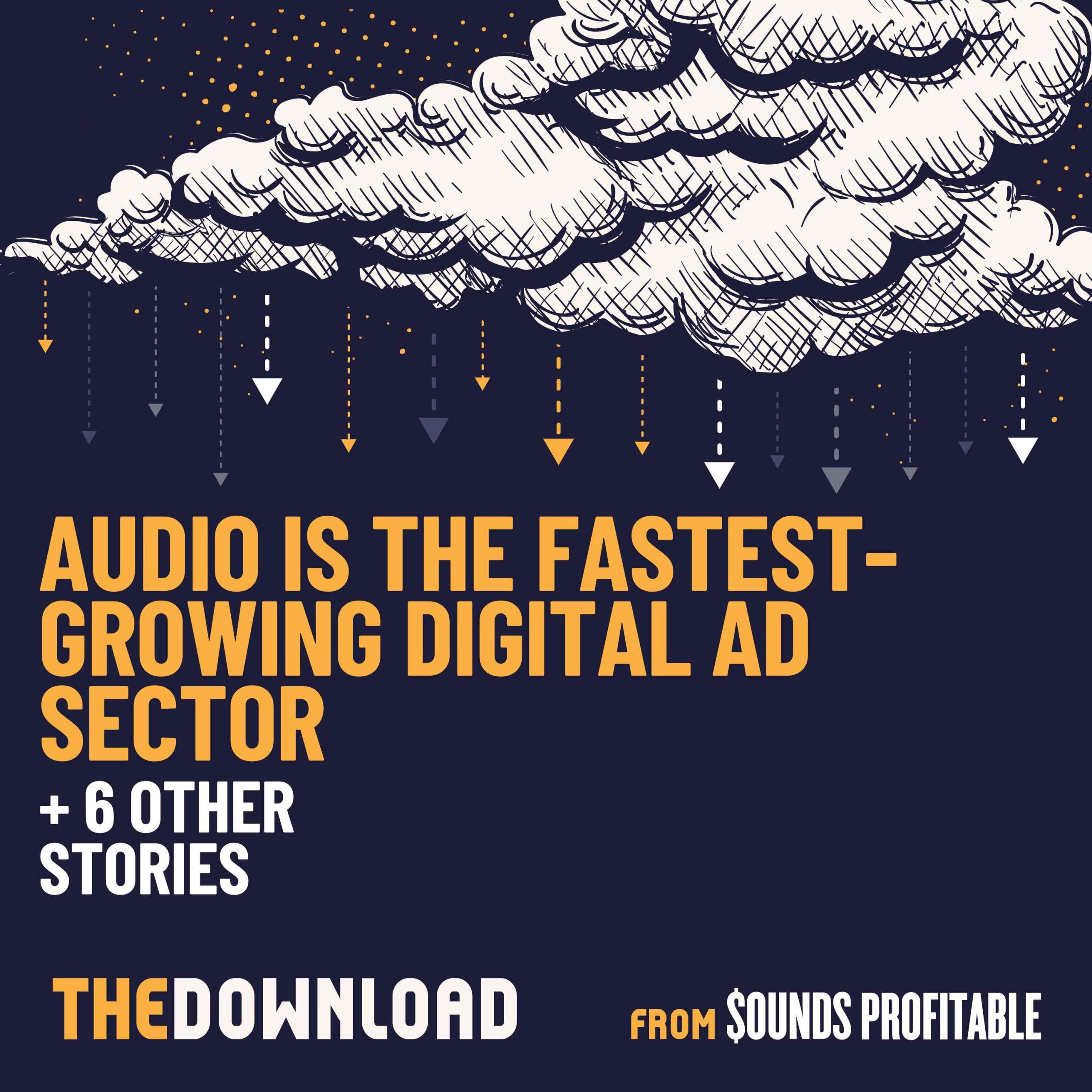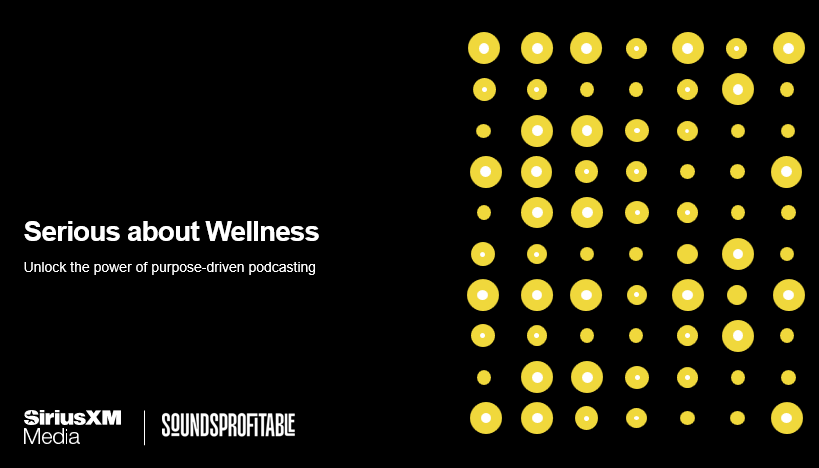00:00:02
Arielle Nissenblatt: Workingwithpodcastappsandplatformstogainpromotionforyourpodcast,that'swhatwe'retalkingaboutonthisweek'sepisodeofSoundsProfitable:AdtechApplied,withme,ArielleNissenblatt,andalsomeArielleNissenblatt,Bryant'snotherethisepisode.Thankstothismonth'ssponsor,Claritas.AsathirdpartyproviderClaritas'whitegloveserviceoffersthescienceandprovenmethodologyforaccurate,transparentandscalablepodcastcampaignmeasurement.Findoutmoreatclaritas.com.SpecialthankstooursponsorsformakingSoundsProfitablepossible.Checkthemoutbygoingtosoundsprofitable.comandclickingontheirlogosinthearticles.Theconversationthatyou'reabouttohearonSoundsProfitable:AdtechAppliedwillchangethewayyouapproachtopotentialcollaborationpartnersforpromotionalopportunitiesforyourpodcast.Thatisalotofplosives,Ihopemymicisdoingokay.I'mArielleandit'lljustbemeatthetopoftoday'sepisode.You'llhearfromBryanBarlettashortlyinconversationwithSteveWilsonfromQCode.Firstupafewthingsbeforewejumpintotoday'sconversation.Haveyoulistenedtothedownloadyet?It'sSoundsProfitable'sweeklypodcastaboutthebusinessofpodcasting.It'shostedbymyfriends,ManuelBedoyaandShreyaSharma,andtheyareincrediblydynamichosts.ItcomesoutonFridaysandit'sperfectbecauseincaseyoumissedanyoftheweek'snewsordidn'thavetimetoreadanyorallofthepodcastnewslettersoutthere,youcangetatonofinformationviathedownload.It'salsoavailableinSpanish,hostedbyManuelandGabeSotofromEdisonResearch,andIreallyrecommendcheckingitout.I'vebeenenjoyinglisteningtoitlatelyonGoodpods.Next,didyouhaveachancetolistentolastweek'sepisodeofSoundsProfitable:AdtechApplied?Init,BryanandItalkedaboutpodcastmovementevolutions,whichtookplacelastmonthinLosAngeles.Iwouldlovetoknowwhatyouthinkofthatepisodeandeveryepisode,weareveryopentofeedbackandconversation.Wewanttohaveanopendialoguewithourlisteners,sopleasedon'thesitatetogetintouch.Okay.Here'swhattoexpectintoday'sepisode,whichisaconversationbetweenBryanandSteveWilson,whoistheCSOorchiefstrategyofficeratQ.SomebriefcontextonQCodebeforewegetintoit.QCodeisapodcastnetworkandaudioproductionstudiobasedinLosAngeles.ThecompanywasfoundedbyRobHertingin2018asapartnershipbetweentheproductioncompanyAutomaticandthemanagementfirmGrandview.Thecompanyfocusesonproducingscriptednarrativepodcasts.QCode'spodcastslateisamazing.Theshowsaresuperhighqualityandtheyoftenfeaturecelebrityvoiceovertalent.BeforejoiningQCode,StevewasatApplePodcastfor15years.He'lltellusmoreabouthisbackgroundandhowheenteredthisprofessionalspaceinjustamoment.Here'swhatIwantyoutolistenforinthisinterviewthatI'mabouttohitplayon,Ipromiseit'scomingsoon.Ifyou'rewonderinghowtogrowyourpodcastbywayofbeingfeaturedonpodcastlisteningapps,Stevesharesalotofadviceonthisfront.Iwon'tspoilitforyou,butyoushouldknowinadvancethatthisistherealgoods.Thisisthestuff,thisisthestuffthatyoushouldbetakinginandconsideringasyouplanoutyournextseasonandhowyou'regoingtomarketit.Idon'twanttospoilmuchmorethanthat,butIdowantyoutoreachouttomeafteryoulistenifyouhaveanyquestionsorthoughts.Ipre-tweetedaboutthisconversationonWednesdayoflastweekasateaserandIdefinitelyhavealotofthoughtsaboutthisadviceandthistacticforpodcastgrowth.Sopleaseusemeasaresource.Useme,useme,useme.Don'tquotemeoutofcontextonthat,butpleaseusemeasaresource.Withoutfurtherado,hereareBryanBarlettaandSteveWilsondiscussingpartnerships,co-marketingandpodcastgrowth.
00:03:49
Bryan Barletta: So Steve, QCode has a really strong relationship with all the major podcast players in the space. How did you go about cultivating those relationships?
00:03:59
Steve Wilson: Well yeah, Brian, as you know, prior to joining QCode, I spent 15 years at Apple Podcast on the podcast team. My job at the time was to do editorial and partner relations. So I was really on the platform side of the table, talking with all kinds of publishers about their content and trying to help them be successful on the platform. Joining QCode is my chance to go to the other side of the table. So I'm certainly working back with the platforms now, representing our content and trying to strike partnerships that are mutually beneficial.
What I always shared with podcasters is that there's a mutual goal in working with the platform. The goal of the platform is to make your content successful on their platform, and they're also fighting against each other for market share. So as a podcaster, you really do have an opportunity to try and align yourself with the goals of a platform, provide value to them in the process of frankly, growing your audience on that platform, which benefits you as a publisher to reach more listeners.
So, the way I approach it today is yeah, just trying to work individually with each platform, getting to know the partner reps at each one, trying to understand the mission and vision of that platform, how they're differentiating themselves from each other, candidly and participate in whatever programs and goals and initiatives that they have that will frankly also mutually align and benefit QCode as we're trying to grow our network and audience.
00:05:16
Bryan Barletta: I mean, that's a really smart way to go about it, because if you think about it is the podcast players are there just to promote your show, well, then that's not healthy for them. That's not going to get them a bigger share of voice. If you submit all the data for them to promote you and that's where it ends and your show and your marketing team and your growth team are not then touting the fact that they've promoted you, it doesn't benefit these players. So the idea that it's one sided is completely wrong. It's awesome that you are part of that process for so long and you built out how Apple would work with all these other partners, which means you understand the things to submit.
But, having been would Sounds Profitable for about two years at this point, what I'm realizing more than anything is Apple holds people all equally to the same standards, and so there's nothing unique necessarily about your relationship with Apple, it's simply that QCode understands and built their whole strategy around how to co-market with these teams, right?
00:06:13
Steve Wilson: That's right. Yeah. I think, another way to put it, the platforms are all looking to be a part of and support the most interesting, coolest hottest content, and from an editorial perspective, when you look at say Apple Podcast, the front page is a magazine. It's a journalistic destination, and so you'll see things there that are timely things that are evergreen, some things that are really niche down and things that are broad interest.
So yeah, in a co-marketing, under the kind of co-marketing headline, what you would want to think about is how the platform that you're working with really kind of speaks to their own audience, speaks to users that they only pop through say editorial front page, but you as a publisher, get outside of that and can help them attract new users to their platform, or frankly, they might be interested in growing their market share among other podcast platforms.
A whole other horizon to this is the fact that the industry and podcasts in general are growing, right? So this is historically where I've been a big proponent of the idea that generic call to action, listen, wherever you get your podcast doesn't frankly benefit anyone, because people who knew what podcasts were 10 years ago knew where they listened to podcast, it was those people who have never listened before, frankly, didn't know what that meant. It would be the equivalent of, I love to jokingly say, it'd be the equivalent of saying, "Watch us wherever you get online video." That doesn't give you a lot of direction, it feels quite nerdy, and these were all, if you look at like Tom Webster and Edison's research a lot of the objections that first time podcast listeners had to starting listening to the medium where the fact that they didn't even know where to go and they perceived it to be really technical and really hard.
So giving your listeners a pointed call to action, and frankly aligning that with a podcast platform, benefits them. It benefits you as well because then people realize, oh, that purple podcast app, that's been on my phone buried in a folder for 10 years. That content's really cool, great. That's going to be my first gateway show and how I got into the medium, and we saw that time and time again, in my old role, and then certainly now we're experiencing that with fiction. There's a gateway show that people need that really draws their attention and becomes that first show that they listen to, and the platforms love that. So the more that you can align your marketing strategy with those goals, that a platform has to grow the better.
00:08:26
Bryan Barletta: Yeah, and that's smart. Simple ways to do that is look around holidays and the calendar in general, if there's any events that you can submit content that really highlights that, that's valuable, and obviously as you have a better relationship with them, they might have initiatives that you can be a part of, but that's not even necessary. Literally the calendar has plenty of events to tie you and these players together. But you hit on something really cool here and that's related to the promotion and of that single saying, wherever you listen or wherever you watch online video, really clever way to say that because, well, does that mean my website? Does that mean Vimeo? Does that mean YouTube? So many options and same with podcasting.
The reason why I asked to come on is because I really like how you and QCode go about promoting on social channels. I feel like it's really different from a lot of things that I come across and maybe I just don't follow enough of the other networks out there to see this. But I would really like for you to like, explain how you do it differently. I don't want to steal your thunder by walking through it because I think it's really clever, and I think it's something that's accessible to everyone.
00:09:26
Steve Wilson: Yeah. Look, I think it's kind of a continuation of what we were talking about before. Ultimately, this is under the headline of partnerships, and creating mutually beneficial scenarios through which you can grow your show. I think what we try and do is really point different audiences to different platforms at different times, and candidly also post, I think you're referring specifically to kind of how we approach social Bryan, and it's like we try and point to different platforms at different times and also provide content that the platforms can help support us in.
So, if we said like 100% of the time to go to our website, that there's really nothing for Apple or iHeart or Spotify to literally retweet at the end of the day, because again, their goal is to grow the audience of that show on their platform, this is getting a little bit in the weeds, but really kind of where the strategy lies is in these tactics, there's nothing for them to retweet. Right? Because they're not going to drive traffic to the QCode website.
00:10:22
Bryan Barletta: Correct.
00:10:22
Steve Wilson: They're interested in driving QCode listenership on their platform. So we really try and segment our call to action out by different platforms at different times, we align it with the platforms who are most investing with us in any given title. So if one of them is really excited about a particular show, wants to develop a co-marketing strategy with us on that show, committed to promoting us on their platform, we're going to respond in kind and create value for them by maybe giving them that first social post, maybe linking to them in the press announcement around that title, above the fold, or put in first position.
They really appreciate that, and so it's really about giving them something that they can support and retweet, and doing that for all the various platforms. There's no set percentage through which we do this. We'll do a mixture of Apple, Spotify, our website, using PodLink and other services to branch out. But if you just link only to your website or link only to PodLink, you're really cutting off an opportunity you have to allow the platforms to help support you in marketing by literally retweeting a post that you have about your show.
00:11:27
Bryan Barletta: Yeah, and people underestimate the value of those retweets. I mean, there's so many times where I'll talk about different people and different companies in the space, and I will tag them in a specific part of the thread or in a specific thread on its own and really highlight something that I like that they're doing or a way that we're collaborating and they'll retweet it, and it gets tons of traction that way. That's valuable to have multiple people sharing the same content. So I love that strategy, and people are worried that it alienates listeners. I don't think it does because if I saw a promotion for QCode show pointing to iHeart, and I wanted to listen to that show if driving to iHeart was off putting for whatever reason, because I don't use the app, that means I'm already in the ecosystem.
That means if that show was attractive, I'm not going to just drop off there. I'll go search it manually, or I'll click deeper into your profile and I'll find the PodLink or other services that you're having to share that on there. It's not going to lose people, it may not grab everyone, but that's why, like you said, your goal really is to spread it around multiple times in a launch strategy, you'll be promoting your website, the general link and then specific players, and so it's incredibly clever. It gives a lot of opportunity for people to share
00:12:43
Steve Wilson: Yeah, that's right. I mean, you put a fine point on it there, Bryan, which is to say somebody who's already following QCode on social media likely already knows where to find us in the app of their choice. This is about making sure that we're putting out content and posts that can get outside of our followership already, and worth noting, that copy needs to be wired to make sense to somebody who isn't familiar with the content. So we could really spend a lot of time getting super into the weeds, but really, it's not like posting new episode now available on something that people aren't going to really resonate with, it's trying to craft that copy to where, if you don't follow QCode, you have no idea who we are. What's exciting about this content? What's the benefit to the listener? Why is it cool? Who's a part of it? That really stands on its own that is the kind of content that a platform or a publication or a journalist or whoever would want to support and retweet and help you again, get outside of your sort of native endemic followership on your social account.
00:13:39
Bryan Barletta: Yeah. It's such a smart way to go about it. This isn't like buying inventory or buying ads on a player. This is cross promotion. This is collaboration, and even if you're just submitting it to a channel and that's the only contact you have when you're submitting, they're asking you how you're going to collaborate like that. So all of these are really smart ideas to prepare for how you can best work with these players, and it doesn't matter the size of the show if you present well, if you have content that overlaps for what they're doing, they do highlight people who go through their funnels.
The biggest feedback I've ever received from these partners is that sometimes those funnels, the reason people aren't selected is because they don't submit all of the content, including the marketing strategy. That's one thing that they all seem to ask for. How are you going to go promote it? So really think that through and take advice from this.
00:14:29
Steve Wilson: Well, I was going to say 100%. Just first thing I would add there, Bryan too, to think about is the platforms love to get excited about how they're meeting podcaster who's already on a mission. I always recommend podcasters really talk about their show and all the exciting things that they're doing, how they're frankly, already on that mission on their own to grow the audience of the show, explain why they created it and what the goal of the show is, how they're growing it, how they're leveraging the platform on their own, and really what you're doing is inviting the platform to reciprocate.
Having been in that position for a long time, you definitely are motivated when you see somebody who's already doing all the things you think, wow, I want to help them go even further, rather than somebody who's maybe sitting back and just driving all their content to their website, or doesn't really engage in trying to grow their content on your platform. You're motivated as somebody on the platform side to really align with the people who are again on that same mission with you, your listeners can't see me weaving my fingers together, but it's truly this handshake between the platforms and the podcaster to try and grow that audience on the platform and I think you kind of want to be a part of that.
00:15:37
Bryan Barletta: Yeah, I mean, think about it, when you have a guest on a show like for this show, we'll put together materials, we'll give something for QCode to want to share this. To highlight both you and both QCode, we'll have assets, we'll have the headliners we'll have all of that, and that's really strong, that collaboration, but giving them, like you said, that law ball to hit that home run. Make it as easy as possible for them to want to work with you, and it kind of falls into place.
00:16:04
Steve Wilson: Yeah, absolutely.
00:16:05
Bryan Barletta: So promoting shows for growth is incredibly challenging and everybody in the industry is hiring right now for people skilled in growing podcasts. The hardest part that I'm seeing is that we're finding people being poached and inflating salaries as they bounce back and forth, because it feels like there's truly like maybe a dozen people or less who are incredibly skilled at this. But I think that in this point of growth that we have right now as an industry, it's a perfect time to invest in people who are motivated to learn this and build it up inside of a company.
So if I said to you, "Steve, my network is growing great, and I'm looking to fill this position." How would I go about not just trying to fill the position, but how would I go about educating and training and growing somebody internally and making that just as valuable as an option as hiring an incredibly well priced individual to come run it for us?
00:16:55
Steve Wilson: I would just say, it's an exciting time on that front, just like so many technology industries and I think of startups in Silicon valley where they first hire engineers and then later hire marketing people. Same thing's true in playing out in podcasts. Audio engineers first, and then as the industry is growing there's a lot of marketing hires happening and really exciting for all the talents and individuals who have been there along the way and certainly I think worth the salaries that they're getting now.
In terms of growing and developing people look, I mean, I don't know that I have any kind of particular secret. I'm really proud of the team that we're assembling at QCode, and candidly, these are all people who have come from other industries.
00:17:33
Bryan Barletta: That's awesome.
00:17:33
Steve Wilson: I have a great person on my team who spent some time in the music industry, a great person on my team who spent some time in TV and film, and I think these are applicable, transferable mindsets and skills. When you think about, frankly what we do at QCode, trying to build cinematic events in audio, limited series, scripted fiction, that have that kind of wow factor. So, what I really saw in these great hires were people who were creative, hardworking, interested in growing the audience in new and non-traditional ways.
I mean, I think we're all building trailers, doing cross promotions, but I think there's a lot out there still that we can do around collaborations in the podcast industry beyond even things like paid buys and stuff like that. So look, I guess if I had one recommendation, it would be to yeah, be creative in terms of hiring and look for the people who get really excited about growing audience and are a little bit obsessive about that regardless of their skillset.
00:18:33
Bryan Barletta: I mean, I think that's the big thing that I try to harp on a lot, teaching about podcasting and the podcast industry should be the easiest thing. Everybody hiring should be able to do that with their eyes closed, and I'm really excited because we'll have an education product completely free for everybody coming out soon from Sounds Profitable to help with that. But that's exactly what you're saying, you found people that were passionate about growth, that had content related experience, similar to what you're trying to accomplish in QCode or transferable, but the podcast part is really what you decided to teach them, and that is where you get the most value. Finding someone that you resonate with, finding someone who can really capture that vision and understand the goals overall, podcasting can be taught, the rest of that stuff, we should be looking outside the space and pulling more people in because it is applicable skills.
00:19:20
Steve Wilson: That's right. Look, the biggest compliment I ever got personally in my career journey, I was about a year and a half out of school, I was looking to go to grad school, started working for Apple retail while I was studying to go to grad school and got recruited into corporate. They were originally looking for someone with MBA, 10 years of experience preferred, and as these conversations continued, I kind of asked them, "Why are you interested in me?" They told me, "Look, we have things that we can't teach and we can teach the rest of what you need to know." That's the same philosophy, Bryan, that you kind of express there, and I try and carry forward as I'm thinking about hiring within our company and we encourage others to do so too. Find the people that have that thing you can't teach, and yes, we can 100% bring more people into the industry and teach them podcasting.
00:20:04
Bryan Barletta: That's awesome. Well, thanks so much for joining me today, Steve.
00:20:08
Steve Wilson: Thanks a ton, really appreciate it.
00:20:12
Arielle Nissenblatt: We want to hear from you, please reach out if you have any questions or comments. We're on Twitter at Sounds Pro News, at Bryan Barletta, or at Arithisandthat. If you want to send us an email that's podcast@soundsprofitable.com.
00:20:26
Bryan Barletta: This show is recorded with Squadcast, the best place to record studio quality, video and audio for content creators. I use Squadcast for all of my podcast recordings and my product deep dive, and it is by far my favorite product in my entire podcast solution. Please check out Squadcast at squad.fm for a free seven day trial, and let me know what you think.
00:20:48
Arielle Nissenblatt: Do you want more from Sounds Profitable? We have a few more podcasts that you can check out. First, we've got, Sounds Profitable, the narrated articles, and then we also have the download, our podcast about the business of podcasting, and of course, both of those are available in Espanol, find links to them in the episode description. Thank you to Evo Terra and Ian Powell for their help on this episode.


 "
"



